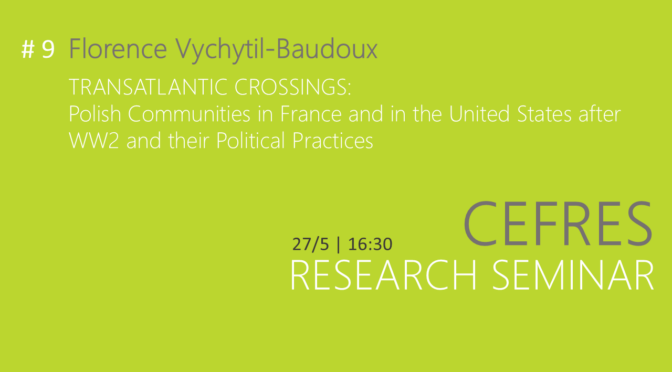Politická činnost polské komunity ve Francii a Spojených státech po 2. světové válce
Devátý seminář CEFRESu
Mezioborový seminář si klade za cíl otevírat diskusi o vědeckých metodách, přístupech a konceptech. Účastníkům umožňuje vzájemně porovnávat své vědecké přístupy a seznamovat se s aktuálními tématy výzkumu napříč obory humanitních věd.
Místo konání: knihovna CEFRESu a online (odkaz k připojení a text ke čtení, prosím, požadujte na adrese cefres@cefres.cz)
Datum: úterý, 27. května 2025, 16:30
Jazyk: angličtina
Přednášející: Florence Vychytil-Baudoux (EHESS / CEFRES)
Diskutující: Françoise MAYER
Text ke čtení: Michael Werner & Bénédicte Zimmermann, « Beyond Comparison: Histoire Croisée and the Challenge of Reflexivity », History and Theory, 2006, vol. 45, no 1, p. 30‑50.
Abstrakt:
V čase od 80. let devatenáctého století do 30. let dvacátého století opustilo polské území tzv. „za chlebem“ více než 12 milionů lidí. Zatímco před první světovou válkou přitahovaly většinu polských rolníků hledajících lepší budoucnost zejména Spojené státy, v meziválečném období se hlavním cílem polských migrantů stala Francie.
V obou zemích, podobně jako v jiných, polští přistěhovalci založili živé komunity, kterým sociologové a historici v průběhu let věnovali značnou pozornost. Tyto vědní přístupy byly nejčastěji založeny na metodologickém nacionalismu; pokusy „vymanit se z korzetu národního státu“ (Walaszek, 2001) obvykle spočívaly v pouhém schraňování publikací, které pojímaly hostitelské státy jako „přirozenou“ jednotku analýzy a byly volně spojeny obecným úvodem. Jakkoli jsou tyto sbírky dat působivé, mají jen malou nebo žádnou další heuristickou hodnotu: kromě naturalizace hostitelských států jako referenčních prostorů mají tendenci spojovat polské zkušenosti v zahraničí pod kategorii „diaspora“ (nebo emický termín „Polonia“) a esencializovat „polskou (přistěhovaleckou) identitu“.
Ačkoli vazby a interakce mezi polskými komunitami v různých zemích zůstávají většinou mimo rámec „ rozdílného srovnávání“ (Green, 2004), tvrdím, že transformace, k nimž došlo ve Francii a ve Spojených státech po 2. světové válce a během studené války, nelze bez vztahového pojetí pochopit. Ve časovém horizontu několika let totiž začali Poláci na obou březích Atlantiku postupně uplatňovat podobné myšlenky a postupy s cílem zvýšit svůj politický vliv, a to navzdory odlišným, ne-li protichůdným politickým systémům, v nichž působili. Umístění a analýza interakcí mezi oběma komunitami osvětluje translokačně dialektické rozměry daných procesů a ukazuje, jak byly lokálně zakotvené politiky a strategie rámovány normami a hodnotami odvozenými z kolektivních reprezentací, které propojovaly více prostorů a časových rovin.
Vztahové pojetí „partikularity a lokality“, které odolává pokušení metodologického nacionalismu i transnacionalismu, nakonec otevírá nové konceptuální a epistemologické perspektivy: zejména odhalení složitých a ambivalentních vztahů mezi národními a diasporickými narativy nám umožňuje se jednak zabývat normativním chápáním emických kategorií, jako je „Polonia“, a jednak se od nich odklonit.
Kompletní program semináře pro 2024-2025 naleznete zde.

